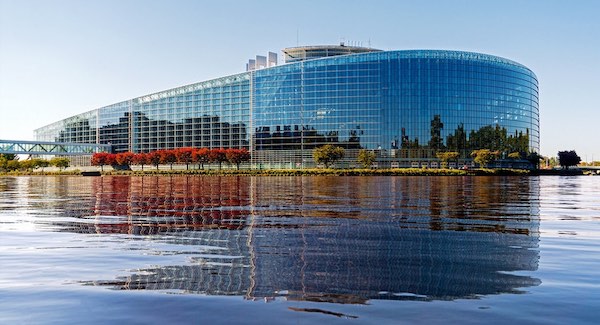
“In a carbon-neutrality pathway, it is evident that the European Parliament needs to consider operation in one site,” a recent report of the parliament’s Environmental Management Unit (EMAS) warns.
The EU Parliament is headquartered in the French city of Strasbourg, but it has also offices in Luxembourg as well as Brussels – which results not only in extra costs but also in additional travel emissions.
Over the past few years, emissions related to the transport of MEPs, assistants, trainees and other parliamentarian staff have been steadily increasing, making mobility the main driver of emissions in the EU Parliament.
In 2018, emissions from transporting staff contributed around 67 percent to the parliament’s carbon footprint – half of it related to the mobility of staff and MEPs (34 percent) as well as subsidised visitors (33 percent).
After MEPs declared a climate emergency in Europe, the EU Parliament was itself instructed to develop a strategy to become carbon-neutral by 2030.
The EMAS report presents a list of short, medium and long-term actions to reduce the institution’s carbon footprint towards carbon-neutrality by the end of the next decade.
These include supporting eco-mobility systems, promoting plant-based diets or introducing carbon budget rules for the institution itself.
Under ‘key long-term action’ (six-to-nine years), the report suggests a treaty change to agree on a single seat, investment in the energy-efficiency of buildings and an internal carbon fee for various emission sources, such as travel, commuting or energy use.
“Some of these suggestions can be implemented quickly with almost no costs, while others need significant behavioural change, big legislative efforts, and strong political will,” the report’s author Georgios Amanatidis told MEPs from the environment committee on Monday (16 November).
“The issue is very difficult, but it is clear if the final aim is to become climate neutral. If you want to have an omelette you have to break eggs,” he also said, referring to the long-standing controversy of the Brussels versus Strasbourg saga.
The EMAS study is further to a request that the European Conservatives and Reformist (ECR) MEPs made in December 2019, after the Green Deal was unveiled.
However, for Czech conservative MEP Alexandr Vondra, “while there is an acknowledgement that the two-seats arrangement is unsustainable, the recommendation for long-term action to find a consensus among member states for a single seat of the EU parliament does not really help to move the debate forward”.
The institution itself has voiced many times its preference to become a single-seat institution, assuming “its responsibility to reduce its carbon footprint”.
In fact, the EU Parliament’s three seats cost amounts to about six percent of the institution’s overall budget.
Covid, the climate, and commuting
Previously, the European Court of Auditors estimated that moving MEPs’ HQ from Strasbourg to Brussels could generate annual savings of €114m, plus €616m if the Strasbourg buildings are sold off, or a one-off cost of €40m if they are not.
The Covid-19 pandemic, meanwhile, has also put into question the two-seat arrangement, showing that videoconferencing and teleworking also works for MEPs who have not been able to go to the French city for plenary sessions since February.
Yet, the pandemic has also shown that French president Emmanuel Macron will fight “tooth and nail” to get parliamentarians back to Strasbourg as soon as possible.
Under the decision of the parliament’s president, David Sassoli, all parliamentarian meetings, including the plenary sessions, are being held remotely until at least the end of November.
Elena Sánchez Nicolás
This article is published with courtesy of
Photo: European Parliament
Blijf op de hoogte met de nieuwsbrief. Meld je hier aan.
( Je kunt ons ook steunen door lid te worden of te doneren )







